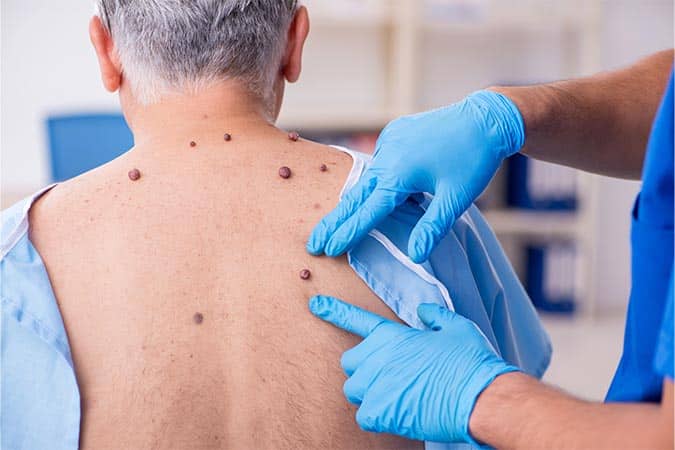What is Skin Cancer?
Skin cancer is an abnormal growth of skin cells that usually develops on skin that has been exposed to the sun. However, it may occur in areas of the body that do not see the sun. Skin cancer occurs when mutations happen in the DNA of skin cells. The mutations cause the cells to grow quickly and out of control, and a mass of cancer cells form. Individuals with fair skin, a history of sunburns, excessive sun exposure, photosensitizing medications, a family history of skin cancer, or an impaired immune system may be at a higher risk for skin cancer.
There are four main types of skin cancer, including:
- Basal cell carcinoma: Usually occurs in areas that are often exposed to the sun, such as the face, neck, trunk, and extremities. It may appear as a pearly or waxy bump, a flat pink patch, a skin-colored or brown bump, a scar-like lesion, or a bleeding and scabbing sore that heals and returns.
- Squamous cell carcinoma: Often occurs in areas that are often exposed to the sun, such as the face, scalp, ears, and hands. Individuals with darker skin are more likely to develop this skin cancer in areas that are not usually exposed to the skin. It may appear as a lesion with a scaly surface or a firm, red nodule that mimics a boil.
- Melanoma: Can develop anywhere on the body, even in areas that have not been exposed to the sun. Signs may include an irregular brown/black spot, a multicolored lesion, or a mole that changes in size or color, or a lesion that burns or itches. Refer to the ABCDEs of melanoma when you are performing a self-examination.
- Nonmelanoma skin cancer: This refers to all types of skin cancer that occur in the skin that are not melanoma. These skin cancers may include Kaposi sarcoma, Merkel cell carcinoma, sebaceous gland carcinoma, and angiosarcoma among others.

Recommended Product
CeraVe AM SPF 30
CeraVe AM Facial Moisturizer is a morning skincare multitasker, featuring 3 essential ceramides that work together to lock in skins moisture and help restore your skin’s protective barrier, hydrating hyaluronic acid and soothing niacinamide. An SPF 30 moisturizer for your everyday protection.
Who is a Good Candidate for Skin Cancer Treatment?
If you have been diagnosed with skin cancer, you would benefit from skin cancer treatment. If you are concerned regarding a skin lesion or growth and believe it may be cancerous, do not hesitate to contact your dermatologist for a skin check. The best way to diagnose and treat skin cancer is through a consultation with one of our dermatologists.
What to Expect During Skin Cancer Treatment?
If you have been diagnosed with skin cancer, you would benefit from skin cancer treatment. If you are concerned regarding a skin lesion or growth and believe it may be cancerous, do not hesitate to contact your dermatologist for a skin check. The best way to diagnose and treat skin cancer is through a consultation with one of our dermatologists.
- Cryosurgery: This treatment can be used to destroy actinic keratoses and early skin cancers by freezing them with liquid nitrogen. This therapy is fast and does not require anesthesia.
- Curettage and electrodesiccation: After removing the majority of the growth, your dermatologist will scrape away layers of cancer cells using a device with a circular blade called a curette. An electric needle destroys any remaining cancer cells.
- Excisional surgery: Your dermatologist can use this treatment for any type of skin cancer. During treatment, the cancerous tissue is cut out, as well as a surrounding margin of safety.
- Mohs surgery: This treatment is used for larger, recurring, or high-risk skin cancers, including basal and squamous cell carcinomas. Your Mohs surgeon will remove the skin growth layer by layer, examining each under the microscope, until all cancer cells are removed.
- Radiation: Patients are referred for radiation therapy if they cannot tolerate surgical procedures.
Following Skin Cancer Treatment
Following skin cancer treatment, the skin cancer should be eliminated. Be sure to follow your dermatologist’s specific instructions regarding treatment and aftercare for the best outcome.
In order to protect your skin from future skin cancer, we recommend that you avoid the sun during the middle of the day (10 a.m. to 4 p.m.), wear sunscreen throughout the year, wear protective clothing when in bright sunlight, and avoid using tanning beds.
Schedule a Consultation
If you are interested in learning more about skin cancer treatment, contact our office today! We will be happy to schedule a consultation with one of our dermatology providers as well as answer any questions that you may have. Our board-certified dermatologists routinely excise and cure both non-melanoma and melanoma skin cancers.

Get Started With A Visit!
Fill out the form below and we will reach out to you shortly to schedule an appointment.